高中英语北师大版高二下册选修模块7 unit20 New Frontiers lesson1 Futurology 课件
文档属性
| 名称 | 高中英语北师大版高二下册选修模块7 unit20 New Frontiers lesson1 Futurology 课件 |

|
|
| 格式 | zip | ||
| 文件大小 | 1.1MB | ||
| 资源类型 | 教案 | ||
| 版本资源 | 北师大版 | ||
| 科目 | 英语 | ||
| 更新时间 | 2017-12-11 00:00:00 | ||
图片预览

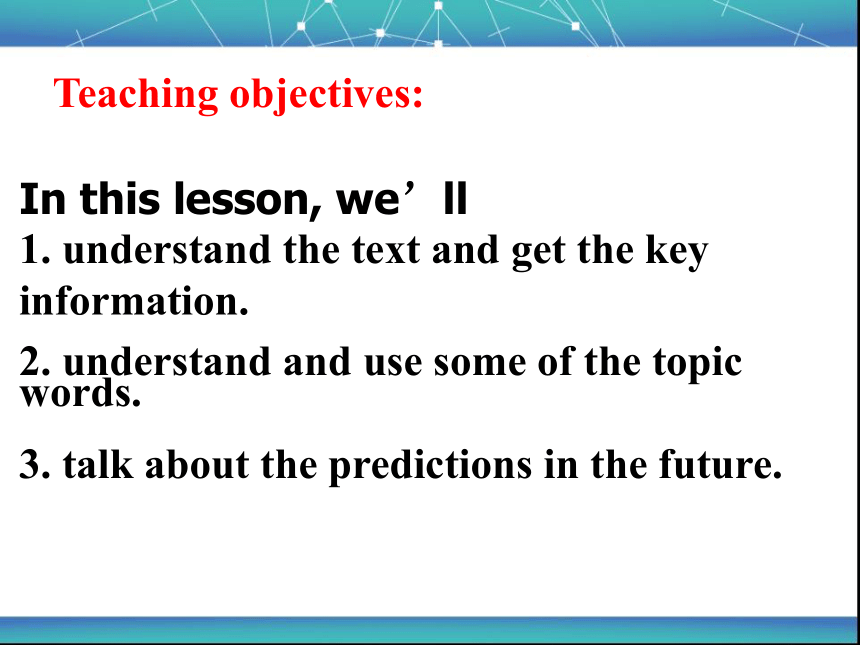
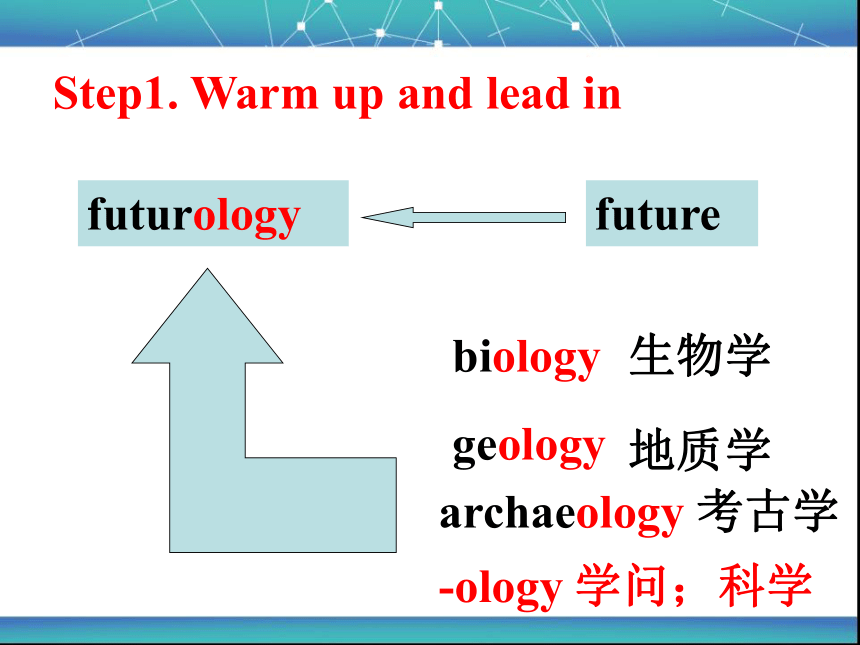
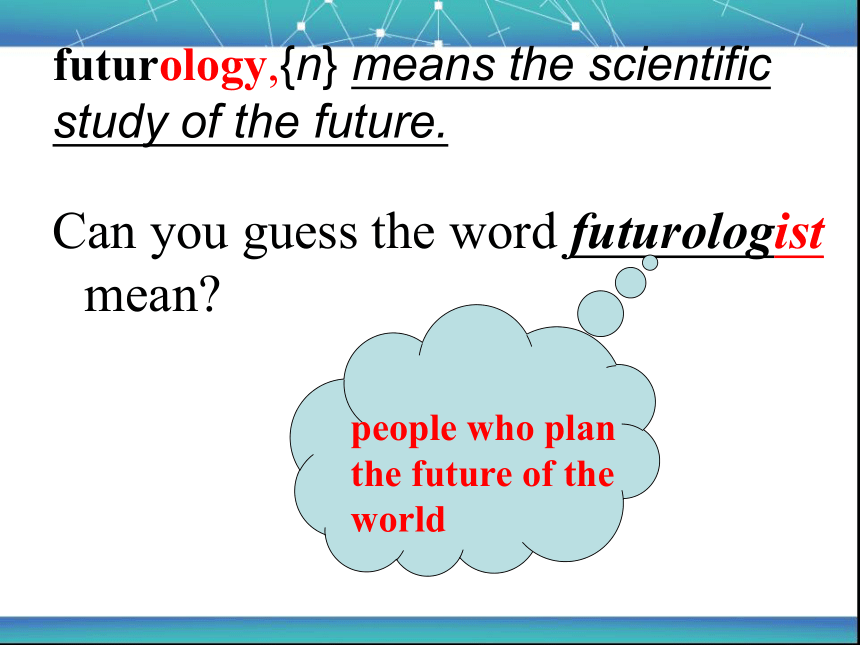
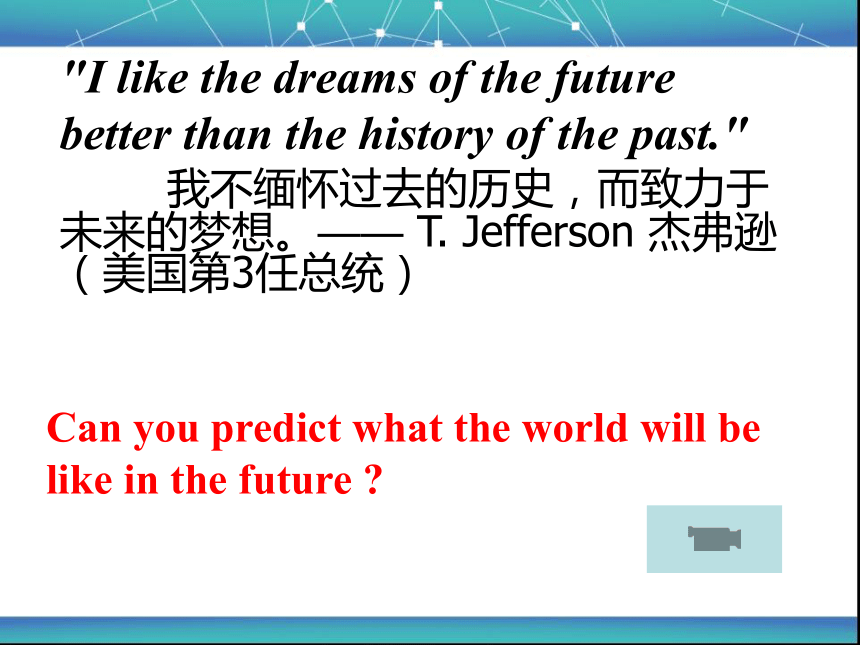
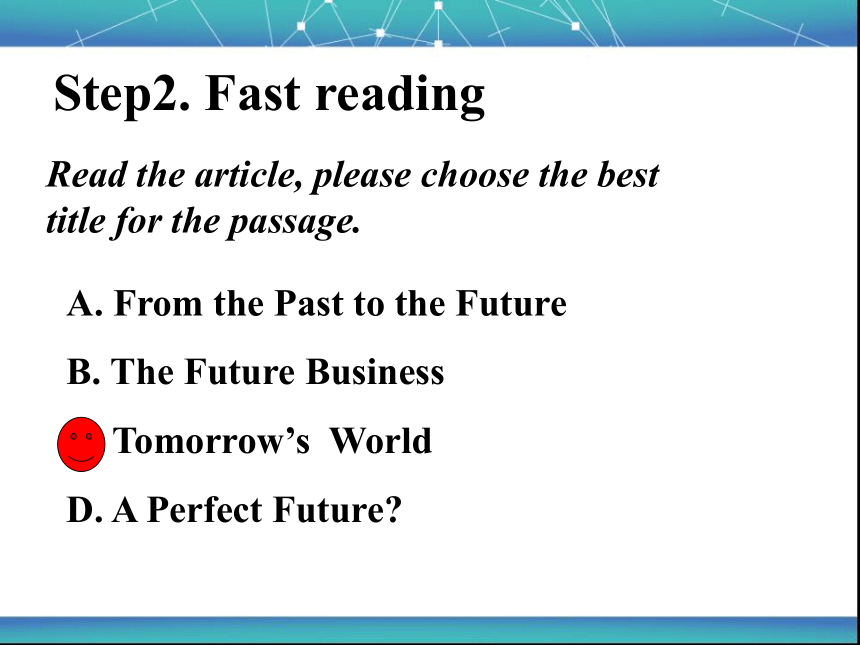
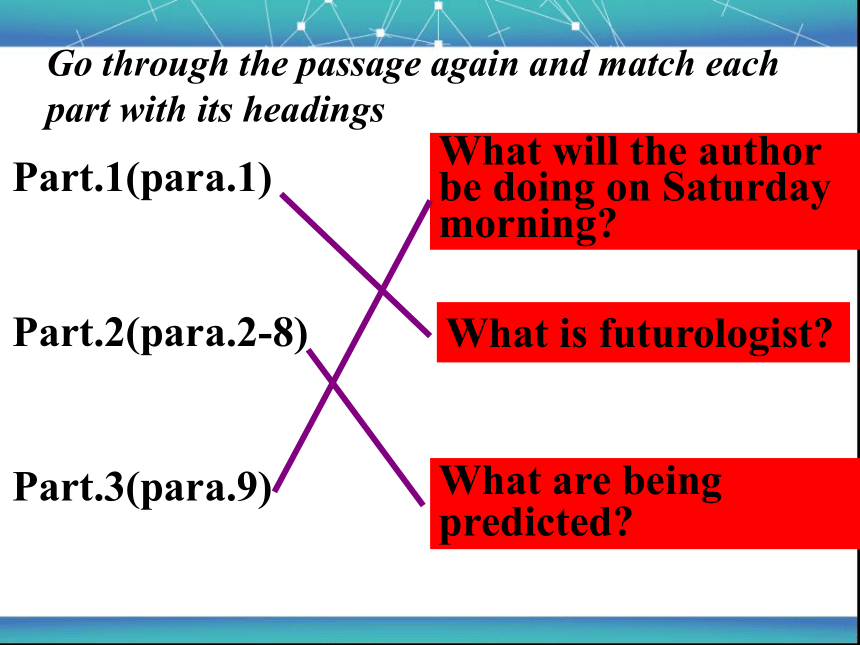
文档简介
课件18张PPT。period1 ReadingLesson1 FuturologyTeaching objectives:In this lesson, we’ll 1. understand the text and get the key information.
2. understand and use some of the topic words.
3. talk about the predictions in the future.Step1. Warm up and lead infuturologybiology生物学geology地质学archaeology考古学-ology学问;科学futurefuturology,{n} means the scientific study of the future.Can you guess the word futurologist mean? people who plan the future of the world"I like the dreams of the future better than the history of the past."
我不缅怀过去的历史,而致力于未来的梦想。—— T. Jefferson 杰弗逊(美国第3任总统)Can you predict what the world will be like in the future ? Step2. Fast readingRead the article, please choose the best title for the passage.A. From the Past to the Future
B. The Future Business
C. Tomorrow’s World
D. A Perfect Future?Go through the passage again and match each part with its headingsPart.1(para.1)
Part.2(para.2-8)
Part.3(para.9)
What will the author be doing on Saturday morning? What is futurologist? What are being predicted?Read part1 and find out what kind of people are called futurologists ?People who like to read fantasy stories and imagine what the world will be like in the future.
People who write science fiction novels about the future themselves.
People who predicted things that finally came true.
People who think about the future for a living.Step3. Careful readingRead the part2 and do the T or F questions People want to start new enterprises with the help of future predictions.
2. Some predictions have come true like
landing on the moon.
3. In the next few years, we will use voice to give computers instructions to avoid hackers attacking the computer system.
4. Computers can do everything for human beings in the future.
5. According to the text, we may be able to live in other suitable places in our solar system at the end of the century. TTFF TWe are interested in predicting future, and so does Hannah Jones. In this passage people predict future from other aspects. Read this part again and complete the table.in the next few yearsby the year 2015by the year 2025by the year 2030by the middle of the centuryby the end of the centuryComputers will become ________. We will be able to ________ any file or _________ our computers.The clothes will become ________, strong, never get old and ______, and won’t be ruined by______.No one would die of_________, live on _______, and there will be no________.It will be possible for us to live for at least _____years.Tiny, insect-like robots may be sent around our bodies to ______our health and ________ repairs.We will be ______ our brains to these computers and a huge database(数据库). We will have discovered other places in our solar system ________ for living and will have discovered ways to go further into space.in the next few yearsby the year 2015by the year 2025Computers will become ________. We will be able to __________ any file or _________ our computers.The clothes will become ________, strong, never get old and ______, and won’t be ruined by_______.No one would die of___________, live on _______, and there will be no__________.handierdownloadupdatestainlesswornstainsstarvationwelfareconflictsby the year 2030by the middle of the centuryby the end of the centuryIt will be possible for us to live for at least _____years.Tiny, insect-like robots may be sent around our bodies to ______our health and _____ _____ repairs.We will be ______ our brains to these computers and a huge database(数据库). We will have discovered other places in our solar system ________ for living and will have discovered
ways to go further into space.150assesscarry outlinkingsuitableStep4. Post readingour healthuniverseclotheselectronic humancomputersthe life of peopleStep4. Post readingour healthexploring spaceclotheselectronic humancomputersthe life of peopleVoice your opinion:
Which of the predictions would you like or not like to come true? Why?Discuss and have a speech: What should we avoid when we develop the future , and explain the reasons.A mini-speechWe can not beat the future, but we should develop the future in the way which benefits us, and form a world which has less pollution, less violence, no war, no conflict. We look forward to a world in which is easy to live.
Step5. HomeworkExercises 1-3 on page 65.
2. understand and use some of the topic words.
3. talk about the predictions in the future.Step1. Warm up and lead infuturologybiology生物学geology地质学archaeology考古学-ology学问;科学futurefuturology,{n} means the scientific study of the future.Can you guess the word futurologist mean? people who plan the future of the world"I like the dreams of the future better than the history of the past."
我不缅怀过去的历史,而致力于未来的梦想。—— T. Jefferson 杰弗逊(美国第3任总统)Can you predict what the world will be like in the future ? Step2. Fast readingRead the article, please choose the best title for the passage.A. From the Past to the Future
B. The Future Business
C. Tomorrow’s World
D. A Perfect Future?Go through the passage again and match each part with its headingsPart.1(para.1)
Part.2(para.2-8)
Part.3(para.9)
What will the author be doing on Saturday morning? What is futurologist? What are being predicted?Read part1 and find out what kind of people are called futurologists ?People who like to read fantasy stories and imagine what the world will be like in the future.
People who write science fiction novels about the future themselves.
People who predicted things that finally came true.
People who think about the future for a living.Step3. Careful readingRead the part2 and do the T or F questions People want to start new enterprises with the help of future predictions.
2. Some predictions have come true like
landing on the moon.
3. In the next few years, we will use voice to give computers instructions to avoid hackers attacking the computer system.
4. Computers can do everything for human beings in the future.
5. According to the text, we may be able to live in other suitable places in our solar system at the end of the century. TTFF TWe are interested in predicting future, and so does Hannah Jones. In this passage people predict future from other aspects. Read this part again and complete the table.in the next few yearsby the year 2015by the year 2025by the year 2030by the middle of the centuryby the end of the centuryComputers will become ________. We will be able to ________ any file or _________ our computers.The clothes will become ________, strong, never get old and ______, and won’t be ruined by______.No one would die of_________, live on _______, and there will be no________.It will be possible for us to live for at least _____years.Tiny, insect-like robots may be sent around our bodies to ______our health and ________ repairs.We will be ______ our brains to these computers and a huge database(数据库). We will have discovered other places in our solar system ________ for living and will have discovered ways to go further into space.in the next few yearsby the year 2015by the year 2025Computers will become ________. We will be able to __________ any file or _________ our computers.The clothes will become ________, strong, never get old and ______, and won’t be ruined by_______.No one would die of___________, live on _______, and there will be no__________.handierdownloadupdatestainlesswornstainsstarvationwelfareconflictsby the year 2030by the middle of the centuryby the end of the centuryIt will be possible for us to live for at least _____years.Tiny, insect-like robots may be sent around our bodies to ______our health and _____ _____ repairs.We will be ______ our brains to these computers and a huge database(数据库). We will have discovered other places in our solar system ________ for living and will have discovered
ways to go further into space.150assesscarry outlinkingsuitableStep4. Post readingour healthuniverseclotheselectronic humancomputersthe life of peopleStep4. Post readingour healthexploring spaceclotheselectronic humancomputersthe life of peopleVoice your opinion:
Which of the predictions would you like or not like to come true? Why?Discuss and have a speech: What should we avoid when we develop the future , and explain the reasons.A mini-speechWe can not beat the future, but we should develop the future in the way which benefits us, and form a world which has less pollution, less violence, no war, no conflict. We look forward to a world in which is easy to live.
Step5. HomeworkExercises 1-3 on page 65.
